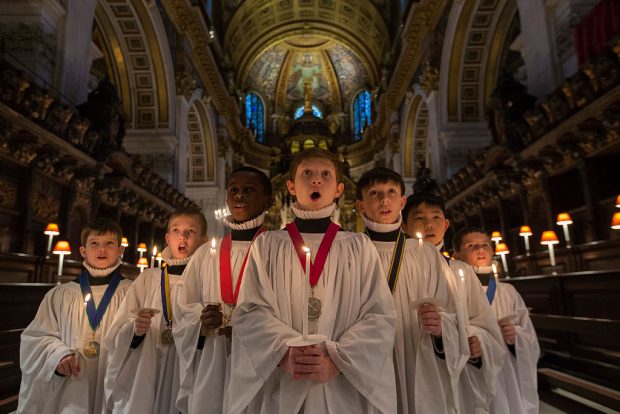At my local carol concert this week, I couldn’t help but despair at the state of the singing. It was just so dire. And it got me thinking: is the same dreadful crooning taking place at churches and carol concerts up and down the country? Are the tone-deaf spoiling age-old songs elsewhere too? If so, it’s a worrying indictment of just how bad British singing has become.
Fortunately, when I was growing up I was always in choirs. Being in the Gluck glitterati, I lived a sheltered life, hidden from the tone deaf and silent myriad. There was never a sermon too dull, or wedding too icky, when I was exposed to the hymn belters. But not any longer; now in the pews, I feel cold and afraid – perhaps because I am without a cassock, but also because others just don’t know how to sing. Or worse, they don’t even try. It seems that many Brits are so wimpy about the whole business of singing. Let’s have it, I say.
So who is to blame for the sorry state of British singing? It’s difficult to know where to start. But despite what the Gareth Malone types would tell you about the great singing renaissance that’s underway, to me it’s just not true. Maybe Jeremy Corbyn is to blame. Has his reluctance to pipe up for the national anthem taken hold? Perhaps. Yet there also seems to be a wider embarrassment about Christmas songs – particularly the ones that stay close to the true meaning of Christmas. This is a great pity, given that some of the best compositions are of a religious nature. Maybe I’m shameless – being only too happy to dive into songs about Jesus and loveable handmaidens, even if my holiness only stretches as far as the treble clef. But without such songs, life – and Christmas – would be poorer.
And so I worry about the British going quiet. I suspect this is not only because hymns are no longer fashionable, but because music education remains rather archaic too. Sheet music desperately needs reinventing; it’s ghastly to understand and a big barrier to accessibility. Too many schools and choirs put a huge emphasis on understanding notation, meaning that many will never experience church songs – because they cannot sight read. Though, in truth, it is entirely possible to sing anything – from Mozart, to Handel, to Rutter – through hearing notes alone. But there are too few music teachers left to tell you that any more.
The impenetrable nature of notation means people increasingly view church music as something cryptic and unattainable in their lives. This Christmas I have lost count of the amount of sheepish choirs on the streets, approaching carols as if they were the most alien thing on earth. If only we could be more like the Americans, I sometimes think. During my time at a summer camp, I couldn’t help but admire the enthusiasm with which the staff and children tackled instruments and singing, many of whom learnt music through ear or tablature. They treasured the songs of their folk-singing forefathers (even if they made one too many about cats or stones going down rivers).
The Brits are responsible for some of the best music throughout history, so we must do more to protect this part of our heritage – even if this means rehashing Bach into more comprehensible form. Religious or not, it is possible for anyone to experience their very own sense of the numinous. But only if they learn to embrace the art of song.






Comments